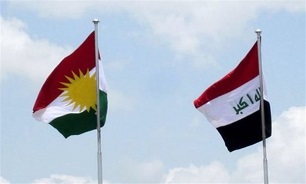Iraq Strikes Deal to Export Kirkuk Oil Again
 Oil Ministry spokesman Assem al-Jihad said on Friday Baghdad and Erbil had agreed on restarting them.
Oil Ministry spokesman Assem al-Jihad said on Friday Baghdad and Erbil had agreed on restarting them.
“The federal government and the government of the (semi-autonomous) Kurdistan Region of Iraq reached a preliminary agreement to resume oil flows starting today from the Kirkuk fields through the KRI’s pipeline to the Ceyhan port in Turkey,” he told AFP.
He said between 50,000 and 100,000 barrels per day would be exported through the Kurdish pipeline. A source from the state’s North Oil Company confirmed that oil had begun pumping out of Kirkuk at 10 a.m. Friday morning, describing it a test. “It began as an experiment with 50,000 bpd and will later reach an average of 80,000 bpd," the source added.
The Kirkuk fields have changed hands several times in recent years in a tug-of-war over one of Iraq’s most oil-rich regions.
The Kurds took Kirkuk in 2014, as Daesh swept across parts of Iraq’s north, and began exporting to Turkey from there through their own pipeline at around 420,000 bpd.
Last year, federal forces seized the fields but could only take around 30,000 barrels per day out by tanker truck to Iran. The federal government had pledged to renovate their own parallel pipeline, but experts said it would take two years.
The announcement is one of the earliest victories for Iraq’s new Prime Minister Adel Abdel-Mahdi, a previous oil minister known for his good relations with Kurdish authorities in Erbil.
Iraq is second-largest oil exporter in the Organization of the Petroleum Exporting Countries at 4.5 billion bpd. Oil exports make up almost the entirety of the government’s revenue, bringing in $8.5 billion last month.
Message end/
